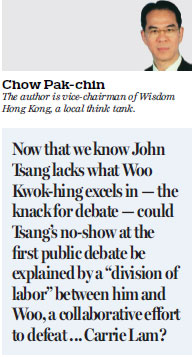Hints of a hidden agenda appear in the CE election race
Updated: 2017-03-10 07:19
By Chow Pak-chin(HK Edition)
|
|||||||
With the Chief Executive election there seems to be a lot of surprises. Just last Saturday, "pan-democratic" lawmakers vowed to give all of their 326 votes to the "most popular" candidate in the leadership race. They were referring to John Tsang Chun-wah, who has received 160 nominations, of which only 10 nominees are from the pro-establishment camp. What's intriguing is that the former financial secretary is, essentially, pro-establishment. The fact that he would curry favor from the opposing political camp - the "pan-democrats" - simply defies logic. In politics, realistically and unfortunately, one can go only so far in the political spectrum to obtain support. Take, for instance, the presidential campaign in the United States. A candidate from the Democratic Party wouldn't even think of canvassing votes from the Republican Party; the most that he or she would do is to secure the swing votes. The same can be said about the system of running to be prime minister in the United Kingdom; for a Conservative candidate to woo favors from the Labour Party would be deemed incomprehensible human folly - if not a political faux pas. Even if we put aside the assumption that a certain number of "pan-democrats" out of the 326 members in the 1,194-member Election Committee might eventually cast their vote for former High Court judge Woo Kwok-hing, John Tsang's wavering political stance still boggles the mind.

But perhaps even more mind-boggling still is the "pan-democrats'" zealous and dedicated involvement in the CE election race, an electoral system that they have long ridiculed as the "small-circle election" - hence their rejection of the resolution of the nation's top legislature on Aug 31, 2014. This stipulates there should be a 1,200-member Nomination Committee for pre-nomination screening. However, instead of boycotting the "small-circle election", the "pan-democrats" are suddenly united and enthusiastic about the very system that they despise, in what appears to be a pretext to get the "lesser evil", John Tsang, elected. Let us get this right: The "pan-democrats" are endeavoring to get a pro-establishment candidate elected - to replace whom? Their own kind, it seems. Not long ago, "Long Hair" Leung Kwok-hung offered himself to be elected in the unofficial nomination exercise, but reception from both the public and his own "pan-democratic" colleagues was lukewarm to say the least. Why the preference of the "lesser evil" over a candidate from their own political camp? You may find the situation genuinely perplexing.
The mystery doesn't end there, however. With his appeals on fundraising platform FringeBacker highlighting the importance of majority public support for his candidacy for the 2017 CE election, one would expect more active participation on John Tsang's part in the advocacy for his proposed policy. But no; in the first public debate of the election race, orchestrated by former Legislative Council member Ronny Tong Ka-wah's think tank Path of Democracy, John Tsang thought his conspicuous absence could be explained by the priority he has given to forums hosted by Election Committee members and the media. In other words, the former financial secretary had decided letting his two fellow contenders - Carrie Lam Cheng Yuet-ngor and Woo Kwok-hing - up their respective ante in the first public debate of the leadership race as the best strategy for obtaining the coveted leadership title. Let's not forget that it wasn't just the forum on Sunday, March 5, that John Tsang decided to lie low on, but also the debate hosted by the insurance sector on Monday, March 6 as well. In an act that defies conventional practice, John Tsang forfeited the opportunity to heighten the public's awareness of his policy proposals as CE contender - an act that, needless to say, invites the suspicions of more discerning minds.
Could this actually be some kind of meticulously calculated strategy instead of simple feeble-mindedness? Now that we know John Tsang lacks what Woo Kwok-hing excels in - the knack for debate - could Tsang's no-show at the first public debate be explained by a "division of labor" between him and Woo, a collaborative effort to defeat the "bigger evil" claimed by the "pan-democrats" that is Carrie Lam? Do indulge me for another half-minute in my conspiracy theory. If such a plot against Lam actually exists, my guess is the scheming process goes all the way back to before the contenders' announcement for candidacy - in fact, all the way back to when John Tsang was still financial secretary. Alas, this is only my humble conjecture, which arose amid much confusion and puzzlement. But it is my genuine wish that John Tsang's dubious moves and the "pan-democrats'" vowed voting, en bloc, for a candidate of the opposing camp, will be duly explained.
(HK Edition 03/10/2017 page2)